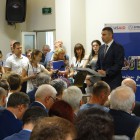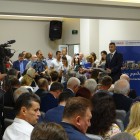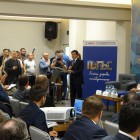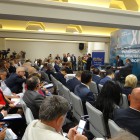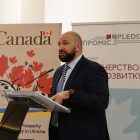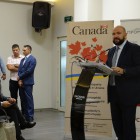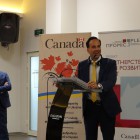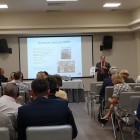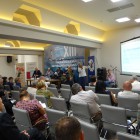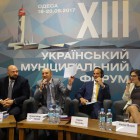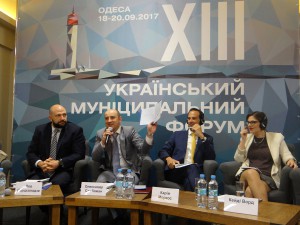
On September,18-20, 2017 Odessa hosted XIII Ukrainian Municipal Forum organized by the Association of Ukrainian cities (AUC). Every year the Forum serves as a platform for training, exchange of experience and Ukrainian and foreign best practices in local self-governance and local economic development. This year the Forum was attended by 250 representatives of local and national authorities, international technical assistance projects, leading Ukrainian and foreign experts.
The Forum was divided into three theme-based days: a Day of Dialogue with State Authorities, held within the framework of USAID’s “The Policy for Ukraine Local Self-Governance” (PULSE) program; a Day of Open Governance and Economic Development of Ukrainian Cities, held within the framework of PLEDDG Project; and an Energy Efficiency Day.
The Day of Dialogue with State Authorities dealt with pressing issues of local self-governance, in particular local self-governance reform, local budgets of territorial communities, housing and utilities sector, land matters and urban development, sectoral reforms (education, health care, social security). Vitali Klitschko, Kyiv Mayor and the Head of AUC, officially opened the forum. In his opening speech, Vitali Klitschko said that Ukraine was going through an active phase of amalgamated territorial communities building, stating that as many as 600 amalgamated territorial communities had already been formed. Hennadiy Zubko, Vice Prime Minister of Ukraine, welcomed participants with his opening address. Among guest speakers and panel discussion members, there were O.Prodan, Ukrainian MP, a member of parliamentary Committee on Revenue and Customs, Y.Kuzkin, Head of Local Budget Department of the Ministry of Finance of Ukraine, T.Slus, Head of State Treasury Service of Ukraine, A.Babak, Deputy Head of parliamentary Committee on Construction, Urban Development, Housing and Utilities, P.Khobzey, Deputy Minister of Education and Science of Ukraine, R.Cherneha, Head of Labor Office of Ukraine, O.Yarema, Deputy Minister of Youth and Sports, etc.
The second day of the forum, the Day of Open Governance and Economic Development of Ukrainian Cities, was organized with the support of PLEDDG Project. During that day participants took part in two plenary sessions and two thematic sessions dedicated to the issues of state policy on promoting regional and local development, implementing principles of democratic governance and ensuring equal rights for men and women in the process of territorial community development.
Executive Director of AUC Oleksandr Slobozhan presented objectives and agenda for the Day of Open Governance and Economic Development of Ukrainian Cities. A welcome address was made by Lev Partskhaladze, Deputy Minister of Regional Development, Construction, Housing and Utilities. Lev Partskhaladze talked about state priorities in the construction sector, in particular an opening of administrative centers which will provide high quality administrative services to communities and will be headquartered in modern buildings; an opening of modern outpatient family-type clinics equipped with modern medical facilities in every residential area. Another initiative is an opening of the new education space in primary schools. Partskhaladze was positive about creating a motivational school environment with creative design, modern equipment and high-speed Internet, all of which are to boost children’s interest in the learning process.
Karim Morcos, Head of Development Cooperation of Embassy of Canada to Ukraine greeted participants on behalf of the Embassy of Canada. He reaffirmed Canada’s commitment to help Ukraine in its reform effort saying that Ukraine could wish for no better friend than Canada. In proof of his statement, Karim Morcos talked about projects of international technical assistance, which were being implemented in Ukraine with the support from Canadian government. One of such projects is PLEDDG. Kadie Ward, Canadian expert and PLEDDG Senior Governance Advisor, also addressed participants.
The first plenary session was dedicated to support for economic development of territorial communities. It started off with the speech made by Oleh Topiha, Head of Department of Implementation and Monitoring of Priority Construction Projects of the Ministry of Regional Development, Construction, Housing and Utilities of Ukraine, who spoke about the government policy of fostering regional and local development, in particular funding for territorial community projects through the State Fund of Regional Development as well as granting subventions to territorial communities. Oleksandr Kamenchuk, Head of the Department of Administrative Services of the Ministry of Economic Development and Trade of Ukraine spoke about economic tools of territorial development. Valeriy Baranov, Deputy Executive Manager of AUC, talked about AUC’s work in supporting the development of Ukrainian cities and lobbying the interests of AUC’s members and development of regional offices. Iryna Ivanochko, a member of AUC Committee on Equal Rights and Opportunities for Men and Women, Head of Culture and Tourism Department of Mykolaiv regional administration, Lviv region, spoke about gender aspects in territorial community development policy.
Canadian experience of lending assistance to rural territorial communities was presented by Joe Masi, Executive Director of Manitoba Association of Municipalities (AMM). Joe Masi spoke about the main functions of AMM, its structure, lobbying and programs of rural community development. When sharing the strategy for lending assistance to rural communities of Manitoba, developed by AMM, Joe Masi emphasized that one of its leading principles was inclusiveness, i.e. ensuring participation of key stakeholders and demonstrating their contribution to the strategy. Another key principle was recognizing that rural economic development does not lie within the competence of the government. The strategy for province development requires cooperation between different regions, government, non-profit and private sectors, organizations and experts of economic development, core communities, scientists and business communities. According to Masi, it was important to take into account the diversity of rural communities, since different regions enjoy different development stages, therefore the strategy should be flexible.
Later that day the discussion continued in two different groups, with one group discussing open governance and the other tackling an innovative approach to AUC’s work as a way of boosting community development. The sessions were moderated by lead experts of PLEDDG Project Kadie Ward and Oleh Voytovych.
The discussion on open governance centered on open governance tools, in particular e-governance, open data, the concept of a smart city, public budget. Valeriy Bakal, Head of Information Technologies Department of the State Agency of Electronic governance, presented an e-governance project. The project is due for consideration by the Cabinet of Ministers on September 20, 2017. According to Bakal, e-governance can improve efficiency of public services through an introduction of modern information and communication technologies into public governance. Andriy Biriukov, Executive Director of Hi Tech Office Ukraine, talked about the concept of a smart city, which provides for the integration of advanced information and communication technologies to improve urban management. Pavlo Radchenko, Operations Manager of International Charity Fund Eastern Europe Foundation, USAID Transparency and Accountability in Public Administration and Services Program (TAPAS), presented an OpenDataBot portal – a Ukrainian companies registration data monitoring service and court register for protection against illegal forcible takeover and counteragent control. The information is gathered from open government registries and other sources. Yanika Merilo, Deputy Mayor of Dnipro, presented the city’s web site for open data. The web site, Open Dnipro, features important information about different spheres of life, in particular city infrastructure, local finances, medicine, construction projects, etc. This information is open and accessible to the public, while the web site itself is user-friendly. Anatoliy Boyko, coordinator of “For Transparent Local Budget”, spoke about transparent budgeting and improving efficiency in the local budgeting process. Vitaliy Marletskyy, Mayor of Kremenchuk, shared a success story of the budgeting process in Kremenchuk. Yuliya Hvozdovych, a representative of Lviv City Council and the Head of Law Committee, spoke about the Open data portal in Lviv, which is an online platform featuring information that is gathered from different structural units of the City Council and other institutions working in the city.
The second session was dedicated to an innovative approach to AUC’s work as a way of boosting territorial community development. AUC Executive Director Oleksandr Slobozhan spoke about a Development Strategy for AUC Regional Offices. He emphasized that the key goal was to provide a broad range of services to AUC members. Andriy Hinkul, project manager of the Center for Reforms and Local Development, spoke about institutional capacity building and creating an information communication system of AUC regional offices. AUC prospects for development became the highlight of discussion involving Serhiy Solomakha, Myrhorod Mayor, Ihor Hirchak, Executive Director of AUC regional office in Ternopil, Liudmyla Dromashko, Pervomaysk Mayor, as well as a number of mayors of other cities.
The second day of the forum was rounded off with a final plenary session to discuss government control in local self-governance. Participants shared international best practices in central government control over local authorities. Andrzej Porawski, Executive Director of the Association of Polish Cities, spoke about the system of government control over Polish municipalities, while Elita Cakule, Director of International Project Office of Norwegian Association of Local and Regional Authorities, presented the Norwegian experience. Denys Volkov, Director of Advocacy and Communications of Association of Manitoba Municipalities, spoke about how federal and province authorities cooperated in Canada.


